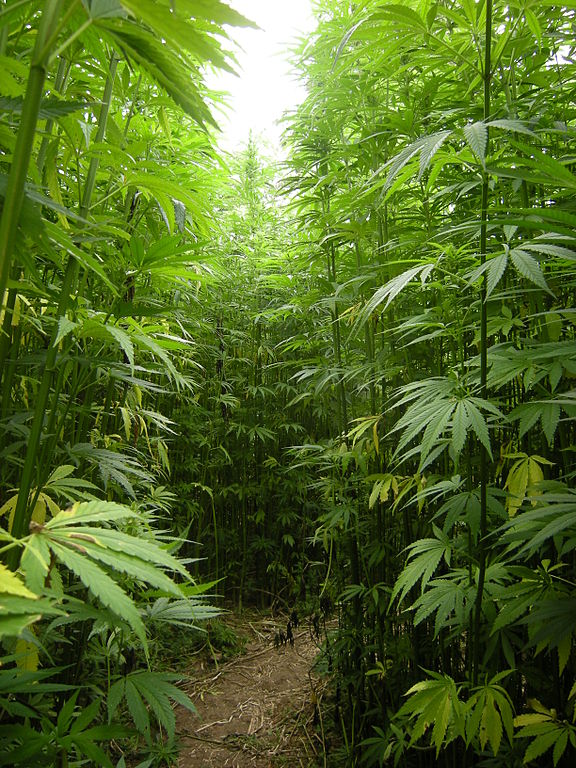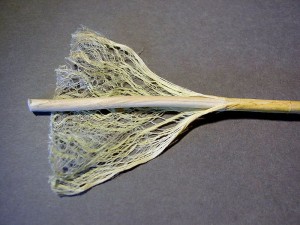Source: bigislandnow.com

A field of hemp
State lawmakers today approved a toned-down bill authorizing the University of Hawaii’s college of agriculture to conduct a two-year study of hemp. Senate Bill 2175 now heads to Gov. Neil Abercrombie for his signature. If Abercrombie signs it into law, it will take effect on July 1.
The research will focus on the potential use of hemp as a biofuel feedstock and in phytoremediation, the use of plants to remove contaminants from soil. The dean of the UH College of Tropical Agriculture and Human Resources (CTAHR) would be in charge of the research. The action was made possible by the passage earlier this year of the federal Agriculture Act of 2014, which authorizes states and universities to legally conduct hemp research.
According to the Hawaii bill, the plant stock to be used in the study must be certified by the state Department of Agriculture as industrial hemp, as opposed to marijuana, its psychoactive cousin.
“If the seed stock cannot be verified by the department of agriculture as industrial hemp seed stock, the dean shall not commence the growing or cultivation of industrial hemp for the research program,” the bill said.
The measure also notes that the research project will immediately come to a halt if any marijuana is found growing at the site. It said no one will be subject to any civil or criminal actions for growing or possessing the hemp as long as the person is participating in the hemp research.
The legislation had been opposed by the Honolulu Police Department, which said it would be difficult to distinguish hemp from marijuana. Supporters of the bill included Rep. Cynthia Thielen, a Republican representing the Kailua and Kaneohe Bay areas of Oahu.
“This progressive, bipartisan bill will keep Hawaii on the cutting edge of agricultural research, help the state realize the economic capabilities of the crop, and potentially restore land previously damaged by earlier contamination,” Thielen said.
She said it could prove valuable in projects such as one currently being done by the City and County of Honolulu and Environmental Protection Agency to remove toxic chemicals from the Waipahu Ash Landfill.
“With its ability to cleanse the soil of toxins and heavy metals, industrial hemp could be an environmentally friendly alternative to existing methods,” Thielen said.
“Using industrial hemp as a phytoremediator also removes the need to excavate or relocate topsoil in contaminated lands, drastically decreasing costs and curtailing the spread of toxic waste to other areas.”

State Rep. Cynthia Thielen shows some products made from hemp. However, the bill passed today focuses on hemp’s use for biofuel and phytoremediation, and does not mention its already common usage for fiber, food and other products. Courtesy photo.
Maria Gallo, dean of the UH College of Tropical Agriculture and Human Resources, which would conduct the research, submitted testimony noting that in its original form, the bill lacked funding to help CTAHR carry out the research.
The House Agriculture Committee on March 20 added $72,600 for the upcoming fiscal year to pay for the program, but that funding was removed during an April 1 hearing by the House Judiciary Committee.
After SB 2175 was approved by the full House on April 8, the Senate indicated that it did not agree with the House amendments, which meant the bill was heading for a conference committee to iron out the differences.
However, last Friday Senate leaders changed their mind and scheduled the bill for a final vote.
They took that vote today with 24 of 25 senators voting in favor of the final House version. Big Island Sen. Gil Kahele was absent and excused.
However, the wording of the bill is not clear on exactly what is required of the college of agriculture. Its Section 2 said the CTAHR’s dean “may establish” the hemp research program and “may” work on the research with others including the US Army Corps of Engineers and the UH John A. Burns School of Medicine.
However, it also said the dean “shall” submit a final report on the research no later than 20 days prior to the 2016 legislative session – a requirement put in place by the House Judiciary Committee.
The bill that passed today shows little resemblance to the much more ambitious version originally proposed by seven senators.
That one contained provisions for establishing an “industrial hemp advisory group” that would advise the state Department of Agriculture on rules regarding hemp cultivation and seed development by public or private institutions as well as individuals. Much of the bill was devoted to the advisory group’s mission of certifying hemp cultivars which would be grown in plots of at least one acre for seed purposes, and at least five acres for research uses.
The version of the bill passed today said only one test site will be used to cultivate industrial hemp, but makes no mention of the size of the plot.
The bill’s original version also had numerous references to hemp’s use for fiber, oil and other products, none of which was included in the bill passed today.

No comments:
Post a Comment